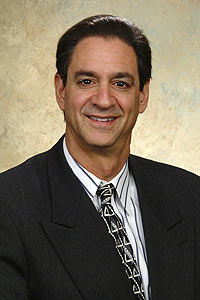Experienced health-systems chief to head medical center
By John EastonMedical Center Public Affairs
 David Hefner | |
David Hefner, an experienced health-systems executive and national academic medical center consultant, has been appointed President of the University of Chicago Medical Center. He began on a part-time basis on Wednesday, Nov. 1, and will become full time on Friday, Dec. 1.
Hefner most recently served for four years, from 2002 to 2006, as the executive director and chief operating officer for Pennsylvania State University’s Milton S. Hershey Medical Center, an integrated health system with a 504-bed adult and children’s hospital and a 600-physician clinical practice.
As a consultant, Hefner was the co-architect of “mission-based management,” a codified set of principles, tools and management practices that has provided medical schools and teaching hospitals with vital insights about their strategic imperatives and day-to-day operations while preparing for dramatic growth and organizational change.
Hefner, 52, succeeds Michael Riordan, who was President of the University of Chicago Hospitals from July 1, 2001, until June 30 of this year. Riordan is now president of the Greenville Hospital System in Greenville, South Carolina.
“David Hefner was selected for his long and impressive track record and wide range of experience in health care administration,” said James Madara, Chief Executive Officer of the University of Chicago Medical Center, Dean of the Division of Biological Sciences and University Vice President for Medical Affairs. “He has helped to run a large academic medical center, provided valuable guidance for health systems nationwide and demonstrated a talent for working closely with physicians and staff to improve operations, increase quality and patient satisfaction, and contain health care costs.”
Medical Center Board Chair Valerie Jarrett said, “David emerged early in the process as the leading candidate. He is widely known for his ability to produce a rapid and beneficial impact on clinical operations, but he is also respected for his ability to collaborate productively with both clinical and research faculty. He has made dramatic improvements at several leading hospitals and health systems as both a hands-on leader and a consultant.”
As executive director and chief operating officer at Penn State’s medical center, Hefner helped engineer a rapid financial turnaround, guiding the institution from a predicted net loss of $24 million to a $7-million gain in 2003. By the time he left, in March 2006, the hospital was considered a “top-tier performer” by the University HealthSystem Consortium in cost and operating efficiencies, clinical quality and overall patient satisfaction.
Hefner earned his B.A. in business administration with a computer science minor in 1976 from the University of Texas at Austin and completed his M.A. in public administration-health services in 1982 at Brigham Young University.
In 1978, he founded Consulting Concepts Inc., a management-consulting firm that advised large physician-group practice operations. He served as its managing partner until its merger with Computer Sciences Corporation in 1994. As a senior partner with CSC, he served as a consultant to multiple academic medical centers on information technology, affiliation agreements, financial turnarounds, operations and sustainable process improvement.
“Having consulted for more than 25 years, I’ve become knowledgeable about many different health systems,” Hefner said, “and the opportunity to take on a leadership role at the University of Chicago Medical Center, one of the world’s leading institutions, is an honor and privilege as well as a huge responsibility. I look forward to working closely with Dr. Madara, the University of Chicago’s renowned physicians and scientists, the senior leadership team and staff to create the most highly integrated and efficient academic health center that continues to be relevant in the community and serves as a leading-edge example for the country.”
![[Chronicle]](/images/sidebar_header_oct06.gif)